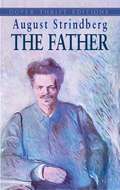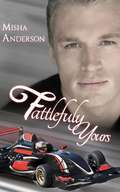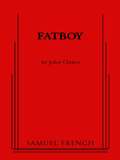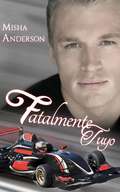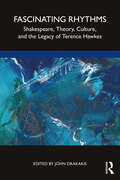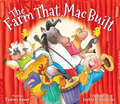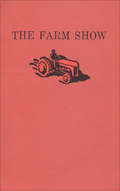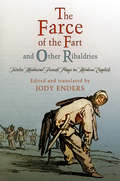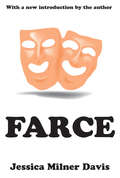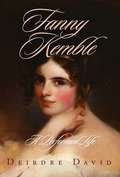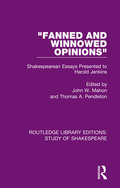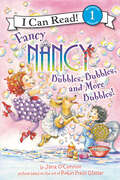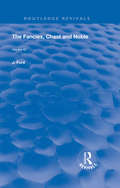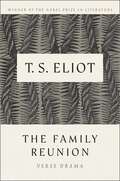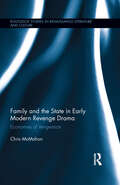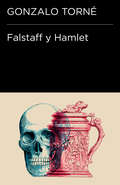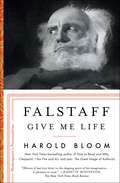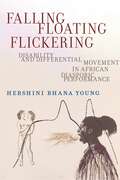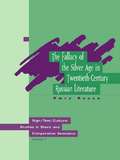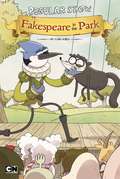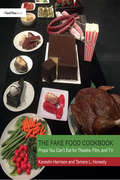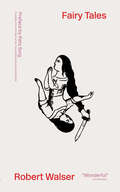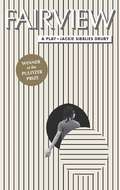- Table View
- List View
The Father: A Tragedy (Dover Thrift Editions: Plays)
by August StrindbergThe stormy personal life of the great Swedish dramatist August Strindberg was punctuated with duels between the sexes, with ruthless, aggressive women usurping the supposedly male prerogative of decision-making and leadership. More than in any of his other plays, Strindberg explores this theme in depth in The Father.In exploring the emotionally charged battle of the sexes and the clashes between scientific and religious convictions, The Father vividly delineates the essential quality of a man’s relationship with his wife and his daughter. The problem of paternity, trivial at the outset, develops into marital upheaval and a no-holds-barred struggle between man and woman.Widely regarded as one of Strindberg's best literary efforts, The Father remains one of the most gripping psychological dramas of the theater.
Fatefully Yours
by Misha AndersonKlaus Braun Schneider is a Formula 1 driver at the height of his career. He’s living in glory, rewriting Brazil’s racing history. Beautiful and seductive, he’s the most wanted single man in the country. There’s nothing that Klaus Schneider doesn’t have: success, fame, money, and women. He’s faster than the wind, the world is at his feet, nothing can stop him. Except...fate. Anahí Saraíba is a physical therapist at the start of a promising career, torn between the white man’s culture and the simple way of life of her indigenous roots. She accepts a job caring exclusively for the recovery of a race driver that’s temporarily paraplegic. Klaus is a challenge for Anahi: depressive, rude, the typical problem-patient. At first, Klaus hates the therapist they found for him, Anahí is too bossy, irritating, combative and...gorgeous. But on a second look, love rearranges all around it, without asking, testing all limits.
Fatboy
by John ClancyJohn Clancy / 3m, 2f / Fatboy is a brutal comedy inspired by Alfred Jarry's Ubu Roi. This satire on modern America's insatiable appetites--from gobbling up 72oz. steaks to small nations--is presented as a live-action Punch and Judy show. In this fast-moving, shocking, profane, dead-on, funhouse mirror reflection of the world today, the brutish allegory known as Fatboy, along with his monstrous wife, Queen Fudgie the First, stands trial for war crimes. Despite overwhelming evidence the court refuses to convict and succumbs to Fatboy's "persuasive" tactics. / "Brazen...daring...highly entertaining." - Jason Zinoman, The New York Times
Fatalmente tuyo
by Audrey Hawes Mayayo Misha AndersonKlaus Braun Schneider es un piloto de fórmula 1 en la cumbre. Está viviendo su momento de gloria mientras reescribe la historia de las carreras brasileñas. Guapo y seductor, encabeza la lista de los solteros más cotizados del país. No hay nada que Klaus Schneider no tenga: Éxito, fama, dinero y mujeres; él es más veloz que el viento y el mundo entero está a sus pies, sin que nada pueda detenerle... ...Excepto el destino. Anahí Saraíba es una joven fisioterapeuta que está empezando una carrera prometedora, dividida entre la cultura del hombre blanco y la forma simple de vivir de su pueblo, los indígenas. Ella aceptará la misión de encargarse exclusivamente de la reabilitación de un piloto que se ha quedado temporalmente parapléjico. Klaus es un desafío para Anahí: Depresivo, inestable, rudo... el típico paciente-problema. A primera vista, Klaus detesta a la fisioterapeuta que le han asignado, Anahí es demasiado mandona, irritante, combativa y... preciosa. A segunda vista, el amor desestructura todo a su alrededor, sin pedir paso, probando todos los límites.
Fascinating Rhythms: Shakespeare, Theory, Culture, and the Legacy of Terence Hawkes
by John DrakakisAs one of the most adventurous literary and cultural critics of his generation, Terence Hawkes’ contributions to the study of Shakespeare and the development of literary and cultural theory have been immense. His work has been instrumental in effecting a radical shift in the study of Shakespeare and of literary studies. This collection of essays by some of his closest colleagues, friends, peers, and mentees begins with an introduction by John Drakakis, outlining the profound impact that Hawkes’ work had on various areas of literary studies. It also includes a poem by Christopher Norris, who worked with Hawkes for many years at the University of Cardiff, as well as work on translation, social class, the historicist and presentist exploration of Shakespearean texts, and teaching Shakespeare in prisons. The volume features essays by former students who have gone on to establish reputations in areas beyond the study of literature, and who have contributed ground-breaking volumes to the pioneering New Accents series. It concludes with Malcolm Evans’ innovative account of the migration of semiotics into the area of business. This book is a vibrant and informative read for anyone interested in Hawkes’ unique blend of literary and cultural theory, criticism, Shakespeare studies, and presentism.
The Farm That Mac Built
by Tammi SauerThe scarecrow from Old Mac Donald&’s farm emcees a barnyard theater production that collapses into hilarious chaos in this rollicking rendition of &“The House That Jack Built.&” It&’s showtime on Old Mac Donald&’s Farm! The barnyard animals are putting on a play—a farm version of "The House That Jack Built"— but other animals keep taking the stage and interrupting the production. First some rambunctious monkeys, then breakdancing kangaroos . . . there&’s even a pair of singing elephants. Everyone knows that monkeys, kangaroos, and elephants do NOT belong on a farm . . . so what to do? Bursting with sound effects and rollicking repetition that will have kids clamoring for repeat readings, this hilarious mashup of two favorite nursery rhymes shows that perseverance and teamwork pay off, and that sometimes you just have to roll with the unexpected and try to have fun with it.
The Farm Show
by Ted Johns'This is a record of our version of grassroots theatre. The idea was to take a group of actors out to a farming community and build a play of what we could see and learn. There is no story or "plot" as such ... Nevertheless, we hope that you can see many stories woven into the themes of this play and that out of it will emerge a picture of a complex and living community.' - Paul Thompson
"The Farce of the Fart" and Other Ribaldries
by Jody EndersWas there more to medieval and Renaissance comedy than Chaucer and Shakespeare? Bien sûr. For a real taste of saucy early European humor, one must cross the Channel to France. There, in the fifteenth and early sixteenth centuries, the sophisticated met the scatological in popular performances presented by roving troupes in public squares that skewered sex, politics, and religion. For centuries, the scripts for these outrageous, anonymously written shows were available only in French editions gathered from scattered print and manuscript sources. Now prize-winning theater historian Jody Enders brings twelve of the funniest of these farces to contemporary English-speaking audiences in "The Farce of the Fart" and Other Ribaldries. Enders's translation captures the full richness of the colorful characters, irreverent humor, and over-the-top plotlines, all in a refreshingly uncensored American vernacular.Those who have never heard the one about the Cobbler, the Monk, the Wife, and the Gatekeeper should prepare to be shocked and entertained. "The Farce of the Fart" and Other Ribaldries is populated by hilarious characters high and low. For medievalists, theater practitioners, and classic comedy lovers alike, Enders provides a wealth of information about the plays and their history. Helpful details abound for each play about plot, character development, sets, staging, costumes, and props. This performance-friendly collection offers in-depth guidance to actors, directors, dramaturges, teachers, and their students."The Farce of the Fart" and Other Ribaldries puts fifteenth-century French farce in its rightful place alongside Chaucer, Shakespeare, commedia dell'arte, and Molière--not to mention Monty Python. Vive la Farce!
Farce (Transaction Series In Humor Ser.)
by Jessica Milner DavisFarce has always been relegated to the lowest rung of the ladder of dramatic genres. Distinctions between farce and more literary comic forms remain clouded, even in the light of contemporary efforts to rehabilitate this type of comedy. Is farce really nothing more than slapstick-the "putting out of candles, kicking down of tables, falling over joynt-stools," as Thomas Shadwell characterized it in the seventeenth century? Or was his contemporary, Nahum Tate correct when he declared triumphantly that "there are no rules to be prescribed for that sort of wit, no patterns to copy; and 'tis altogether the creature of imagination"? Davis shows farce to be an essential component in both the comedic and tragic traditions. Farce sets out to explore the territory of what makes farce distinct as a comic genre. Its lowly origins date back to the classic Graeco-Roman theatre; but when formal drama was reborn by the process of elaboration of ritual within the mediaeval Church, the French term "farce" became synonymous with a recognizable style of comic performance. Taking a wide range of farces from the briefest and most basic of fair-ground mountebank performances to fully-fledged five-act structures from the late nineteenth century, the book reveals the patterns of comic plot and counter-plot that are common to all. The result is a novel classification of farce-plots, which serves to clarify the differences between farce and more literary comic forms and to show how quickly farce can shade into other styles of humor. The key is a careful balance between a revolt against order and propriety, and a kind of Realpolitik which ultimately restores the social conventions under attack. A complex array of devices in such things as framing, plot, characterization, timing and acting style maintain the delicate balance. Contemporary examples from the London stage bring the discussion u
Fanny Kemble
by Deirdre DavidA ForeWord magazine Book of the Year for 2007Charismatic, highly intelligent, and splendidly talented, Fanny Kemble (1809-93) was a Victorian celebrity, known on both sides of the Atlantic as an actress and member of the famous Kemble theatrical dynasty, as a fierce opponent of slavery despite her marriage to a wealthy slave owner, as a brilliantly successful solo performer of Shakespeare, and as the author of journals about her career and life on her husband's Georgia plantations. She was, in her own words, irresistible as a "woman who has sat at dinner alongside Byron . . . and who calls Tennyson, Alfred."Touring in America with her father in the early 1830s, Kemble impulsively wed the wealthy and charming Philadelphia bachelor Pierce Butler, beginning a tumultuous marriage that ended in a sensational divorce and custody battle fourteen years later. At the time of their marriage, Kemble had not yet visited the vast Georgia rice and cotton plantations to which Butler was heir. In the winter of 1838, they visited Butler's southern holdings, and a horrified Kemble wrote what would later be published on both sides of the Atlantic as Journal of a Residence on a Georgian Plantation. An important text for abolitionists, it revealed the inner workings of a plantation and the appalling conditions in which slaves lived. Returning to England after her divorce, she fashioned a new career as a solo performer of Shakespeare's plays and as the author of memoirs, several travel narratives and collections of poems, a short novel, and miscellaneous essays on the theater. For the rest of her life, she would divide her time between the two countries.In the various roles she performed in her life, on stage and off--abolitionist, author, estranged wife--Kemble remained highly theatrical, appropriating and subverting nineteenth-century prescriptions for women's lives, ever rewriting the roles to which she was assigned by society and inheritance. Hers was truly a performed life, and in the first Kemble biography in twenty-five years to examine that life in its entirety, Deirdre David presents it in all its richness and complexity.
"Fanned and Winnowed Opinions": Shakespearean Essays Presented to Harold Jenkins (Routledge Library Editions: Study of Shakespeare)
by John W. Mahon and Thomas A. PendletonOriginally published in 1987, "Fanned and Winnowed Opinions" celebrates the scholarship of Professor Harold Jenkins, one of this century’s foremost editors and critics of Shakespeare. All of the essays address Shakespearean topics, and many of the sixteen focus on the years between 1595 and 1605, the period on which much of Professor Jenkin’s work centers: there are, appropriately, three essays on Hamlet. A variety of critical approaches is represented, including the Freudian and the feminist; some essays focus on one play, while others take a thematic approach. Comedies, histories, and tragedies all come under consideration. The contributors include many distinguished scholars, some of whom studied under Professor Jenkins or edited volumes of the Arden Shakespeare under his direction. All of the contributions were specifically written for the Festschrift and had not appeared in print before. In addition to the scholarly essays, the volume features an introduction with an appreciative review of Harold Jenkins’ career and a complete bibliography of his works.
Fancy Nancy: Bubbles, Bubbles, and More Bubbles! (I Can Read Level 1)
by Jane O'ConnorFancy Nancy and her class are going to see The Big Bubble Show!Nancy and Bree can’t wait to go. But when Bree gets sick and has to miss the show, Nancy decides to put on a bubble show of her own. Will Nancy and her classmates be able to put on the best bubble show ever?From the beloved New York Times bestselling author-illustrator team Jane O’Connor and Robin Preiss Glasser, Fancy Nancy: Bubbles, Bubbles, and More Bubbles is a Level One I Can Read, perfect for children learning to sound out words and sentences.
The Fancies, Chaste and Noble (Routledge Revivals)
by John FordPublished in 1985: The main plot portrays the bachelor Octavio, Marquis of Siena, and his establishment of his "Bower of Fancies," something like a Platonic academy for those he calls the "fancies" — Clarella, Silvia, and Floria, three young women who are, or are said to be,"young, wise, noble, fair, and chaste.
The Family Reunion: Verse Drama (Faber Paper-covered Editions Ser.)
by T. S. EliotA modern verse play dealing with the problem of man’s guilt and his need for expiation through his acceptance of responsibility for the sin of humanity. “What poets and playwrights have been fumbling at in their desire to put poetry into drama and drama into poetry has here been realized.... This is the finest verse play since the Elizabethans” (New York Times).
Family and the State in Early Modern Revenge Drama: Economies of Vengeance (Routledge Studies in Renaissance Literature and Culture)
by Chris McMahonIn this book, McMahon considers Early Modern revenge plays from a political science perspective, paying particular attention to the construction of family and state institutions. Plays set for close study are The Spanish Tragedy, Hamlet, The Revenger’s Tragedy, The Malcontent and The Duchess of Malfi. The plays are read as unique events occupying positions in historical process concerning the privatisation of the family (by means of symbolism and concrete household strategies such as budgeting and surveillance) and the subsequent appropriation of the family and its methods by the state. The effect is that family becomes an unofficial organ of the state. This process, however, also involves the reform of the state along lines demanded by the private family. McMahon’s critical method, derived from the theory of Bourdieu, Bataille, and Girard, maps capital transactions to reveal emotionally charged, often idiosyncratic responses to issues of shared concern. Such issues include state corruption, the management of women, the performance of roles according to gender, the uses of surveillance, and the ethics of sacrifice.
Fame, Glory, and Other Things on My To Do List
by Janette RallisonIt's been a week and a half since Brendan broke up with me, but I try not to think about him. He only crosses my mind when I see Lauren and him walking around the hallways holding hands, or when they eat lunch in the cafeteria sitting so close together you'd think they were Siamese twins, or when I cry myself to sleep every night. But besides all of that, I'm doing really well. On the night I met Jordan, I wasn't thinking about Brendan at all. After my shift at Wal-Mart was over, I walked out into the parking lot debating the merits of boy names for girls instead of dwelling on the fact that it was Friday night and Brendan and Lauren were out somewhere practicing their Siamese twins routine.
Falstaff y Hamlet (Colección Endebate #Volumen)
by Gonzalo TornéUn fascinante ensayo sobre dos personajes fundamentales de Shakespeare que no terminan de encajar en su contexto. Hay una clase de personajes que tienen una función narrativa distinta a la del resto: no tienen carne ni sangre, están hechos de palabras como el resto de personajes, pero parecen pertenecer a otro plano de la realidad: saben muchas cosas y actúan como un motivador contratado para dinamizar la obra. El lector reconoce en su perfil desdibujado que tienen un pie fuera (por enfermedad, por mayor experiencia, por pertenecer a un rango social inferior) del escenario común donde actúan el resto de figuras: su función narrativa consiste en propiciar la acción, en cometerla, en actuar como directores de escena vicarios. En este audaz ensayo Gonzalo Torné, tan brillante novelista como perspicaz crítico, propone una lectura de Shakespeare en la que Falstaff y Hamlet inauguran esa estirpe, que más tarde recogerán autores como Henry James, Iris Murdoch o John Coetzee.
Falstaff: Give Me Life (Shakespeare's Personalities #1)
by Harold BloomFrom Harold Bloom, one of the greatest Shakespeare scholars of our time as well as a beloved professor who has taught the Bard for over half a century, an intimate, wise, deeply compelling portrait of Falstaff—Shakespeare’s greatest enduring and complex comedic character.Falstaff is both a comic and tragic central protagonist in Shakespeare’s three Henry plays: Henry IV, Parts One and Two, and Henry V. He is companion to Prince Hal (the future Henry V), who loves him, goads, him, teases him, indulges his vast appetites, and commits all sorts of mischief with him—some innocent, some cruel. Falstaff can be lewd, funny, careless of others, a bad creditor, an unreliable friend, and in the end, devastatingly reckless in his presumption of loyalty from the new King. Award-winning author and beloved professor Harold Bloom writes about Falstaff with the deepest compassion and sympathy and also with unerring wisdom. He uses the relationship between Falstaff and Hal to explore the devastation of severed bonds and the heartbreak of betrayal. Just as we encounter one type of Anna Karenina or Jay Gatsby when we are young adults and another when we are middle-aged, Bloom writes about his own shifting understanding of Falstaff over the course of his lifetime. Ultimately we come away with a deeper appreciation of this profoundly complex character, and the book as a whole becomes an extraordinarily moving argument for literature as a path to and a measure of our humanity. Bloom is mesmerizing in the classroom, wrestling with the often tragic choices Shakespeare’s characters make. He delivers that kind of exhilarating intimacy and clarity in Falstaff, inviting us to look at a character as a flawed human who might live in our world. The result is deeply intimate and utterly compelling.
Falling, Floating, Flickering: Disability and Differential Movement in African Diasporic Performance (Crip #7)
by Hershini Bhana YoungInsists on the importance of embodiment and movement to the creation of Black socialityLinking African diasporic performance, disability studies, and movement studies, Falling, Floating, Flickering approaches disability transnationally by centering Black, African, and diasporic experiences. By eschewing capital’s weighted calculus of which bodies hold value, this book centers alternate morphologies and movement practices that have previously been dismissed as abnormal or unrecognizable. To move beyond binaries of ability, Hershini Bhana Young traverses multiple geohistories and cultural forms stretching from the United States and the Mediterranean to Sierra Leone, Nigeria, and South Africa, as well as independent and experimental film, novels, sculptures, images, dance, performances, and anecdotes. In doing so, she argues for the importance of differential embodiment and movement to the creation and survival of Black sociality, and refutes stereotypic notions of Africa as less progressive than the West in recognizing the rights of disabled people. Ultimately, this book foregrounds the engagement of diasporic Africans, who are still reeling from the violence of colonialism, slavery, poverty, and war, as they gesture toward a liberatory Black sociality by falling, floating, and flickering.
Fallacy of Silver Age
by Omry RonenIn this study, Ronen critically examines the term "Silver Age", which over the years has gained such wide currency among historians and connoisseurs of 20th century Russian culture. The author traces the origin and the controversial development of what he condemns as an influential misnomer. Ronen sets out to debunk the myth that attributes invention of the term to Nikolai Berdiaev, and in turn traces this widely used catchword in the critical idiom from an abscure, avante-garde manifesto to the present day. He lays to rest the use of the term which he sees as the most misleading constituent of Russia's contemporary cultural self-awareness and self-assessment.
Fakespeare in the Park
by Gabe SoriaHast thou heard of Shakespeare in the Park? Bro, this is so much cooler. Mordecai and Rigby are trying to slack off again, only this time it's about to ruin The Park's Shakespeare festival. This clever novel presents a light-hearted story of how Mordecai and Rigby from Regular Show try their hardest to get out of work and in the process wreak havoc on the festival in The Park. As usual, they must rely on their friends to help them cleanest up thy mess.
The Fake Food Cookbook: Props You Can't Eat for Theatre, Film, and TV
by Tamara Honesty Karestin HarrisonThe Fake Food Cookbook: Props You Can’t Eat for Theatre, Film, and TV contains step by step instructions on how to create the most realistic prop food for a theatrical production. From appetizers such as oysters on a half shell and chicken wings, entrees such as lobster and honey-glazed ham, to desserts, breakfasts, and even beverages, every meal is covered in this how-to guide. Full color images of each step and finished products illustrate each recipe, along with suggestions for keeping the budget for each project low. Safety Data Sheets and links to informative videos are hosted on a companion website.
Fairy Tales: Dramolettes
by Reto Sorg James Reidel Daniele Pantano Robert WalserThree mini-plays by the German wunderkind and asylum-dweller. Fairy Tales gathers the unconventional verse dramolettes of the Swiss writer Robert Walser. Narrated in Walser's inimitable, playful language, these theatrical pieces overturn traditional notions of the fairy tale, transforming the Brothers Grimm into metatheater, even metareflections. Snow White forgives the evil queen for trying to kill her, Cinderella doubts her prince and enjoys being hated by her evil stepsisters; the Fairy Tale itself is a character who encourages her to stay within the confines of the story. Sleeping Beauty, the royal family, and its retainers are not happy about being woken from their sleep by an absurd, unpretentious, Walser-like hero. Mary and Joseph are taken aback by what lies in store for their baby Jesus.
Fairview: A Play
by Jackie Sibblies DruryWinner of the 2019 Pulitzer Prize for Drama. <p><p> Grandma's birthday approaches. Beverly is organizing the perfect dinner, but everything seems doomed from the start: the silverware is all wrong, the carrots need chopping and the radio is on the fritz. What at first appears to be a family comedy takes a sharp, sly turn into a startling examination of deep-seated paradigms about race in America.
